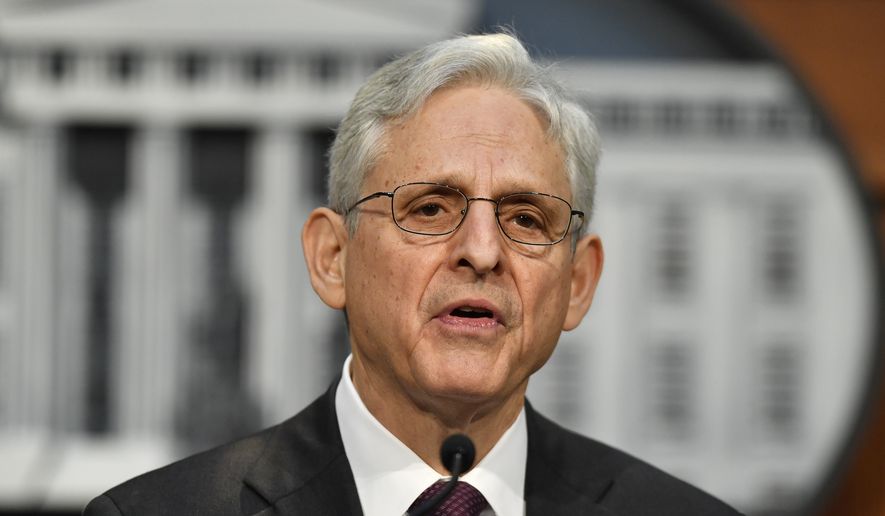The Biden administration had “no legitimate basis” to deploy federal counterterrorism resources against parents who protested against local education officials, according to an interim report on Attorney General Merrick Garland’s 2021 school boards memo released by the House Judiciary Committee.
Citing a trove of recently obtained documents, lawmakers behind Judiciary’s weaponization subcommittee probe into the controversial memo said the Biden administration “misused federal law-enforcement and counterterrorism resources for political purposes.”
“The Justice Department’s own documents demonstrate that there was no compelling nationwide law-enforcement justification for the Attorney General’s directive or the Department components’ execution thereof,” the interim report reads.
The panel released documents on Tuesday as part of the report. The documents show “strong negative reactions” to Mr. Garland’s memo by local law enforcement officials days after it was issued.
Several U.S. Attorneys reported back to DOJ headquarters with objections by their local law enforcement counterparts in issues involving local school board meetings in the weeks following the memo.
William Ihlenfeld II, U.S. Attorney for the Northern District of West Virginia, wrote in a report to DOJ headquarters that there had been “a handful” of local school board meetings where attendees had “been boisterous and disruptive” but that those incidents should be handled by local police.
U.S. Attorney Steven D. Weinhoeft of the Southern District of Illinois reported that Mr. Garland’s memo was “very poorly received” among local law enforcement officials, some of whom described the threats outlined in the memo as “a manufactured issue.”
“No one I spoke with in law enforcement seemed to think that there is a serious national threat directed at school boards, which gave the impression that our priorities are misapplied,” Mr. Weinhoeft reported to DOJ headquarters.
“Some expressed concerns that the federal government was meddling in an area where it does not belong,” he added.
Despite the lack of a compelling need for federal resources, the FBI acknowledged to the House panel that it opened 25 threat assessments known as “Guardian assessments” in response to concerns raised over threats against school boards, six of which were conducted but the FBI Counterterrorism Division.
“These admissions supplement whistleblower disclosures about the FBI’s actions, including disclosures the FBI investigated a mom because she belonged to a ‘right-wing mom’s group’ and ‘is a gun owner’ and a dad because ‘he rails against the government,’” the committee said in Tuesday’s report.
None of those investigations have resulted in federal arrests or charges, the panel said in the report.
Mr. Garland issued his memo ordering the Justice Department to sniff out “threats” against school boards in response to a letter from the National School Boards Association demanding federal authorities crack down on parents who, according to the school boards group, were becoming upset at local school board meetings.
In their report released Tuesday, lawmakers on the House panel accused the White House and the Education and Justice departments of coordinating among themselves and with the NSBA before the release of the memo.
The report claims that Chip Slaven, interim director and CEO of the NSBA, emailed the NSBA’s letter to the White House and Department of Education before it was released publicly.
In an email to Biden administration officials, Mr. Slavin outlined his specific request that “federal law enforcement and relevant agencies work with state and local authorities and public schools to address these ongoing threats.”
Documents released in Tuesday’s report also show that the NSBA coordinated with the DOJ before the Oct. 4, 2021, release of Mr. Garland’s memo.
In an email to Mr. Slaven before the memo’s release, Alivia Roberts from the DOJ’s Public Affairs office thanking the NSBA for raising its concerns.
“We hope to continue this dialogue as this is a very important issue the department is committed to addressing,” Ms. Roberts wrote.
Mr. Slaven replied that the NSBA “stand[s] ready to work with you on efforts going forward. Please let us [know] how we can support your efforts.”
The DOJ, NSBA, White House, and Department of Education did not immediately respond to requests for comment Tuesday from The Washington Times.
The lawmakers behind the report accused the Biden administration of attempting to silence critics of “its radical education policies.”
Mr. Garland says he did not order parents investigated for expressing concern over their children’s education. He said he intended to root out “violence and threats of violence against a whole host of school personnel.”
He acknowledged he was prompted “in part” by the NSBA letter, but said he was also reacting to news reports about violence.
“Nothing in my memorandum says to investigate parents who are angry, quite the opposite. It says that the First Amendment protects that kind of vigorous debate,” he told the Senate Judiciary Committee earlier this month. “The only thing we wanted was for an assessment to be made out in the field about whether federal assistance was needed to prevent violence and threats of violence.”
Lawmakers on the House weaponization panel aren’t buying the explanation and have committed to continuing its probe “until all responsive documents are produced and interviews with the necessary parties take place.”
“Americans deserve to have confidence that the enormous power and reach of federal law enforcement will be used fairly and free of any indication of politicization,” the report reads. “The Committee’s and the Select Subcommittee’s work is not complete.”
• Joseph Clark can be reached at jclark@washingtontimes.com.




Please read our comment policy before commenting.